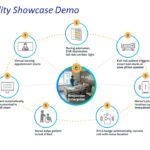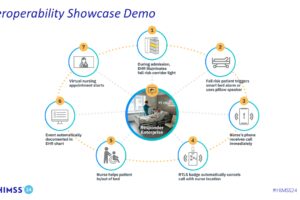Apple and Google have announced that they’ll work together to help governments and health agencies trace contacts made by people who have contracted the COVID-19 virus. The effort, which will only involve users who have opted in, will rely on Bluetooth technology.
To kick off the initiative, the tech giants are launching a multi-layered solution including APIs and operating system-level technology. The first step in rolling out the solution will take place in May when the two companies will release the APIs, which will support interoperability between Android and iOS devices using apps from public health authorities. The apps will be available on both of the related app stores.
As part of the initial rollout, Google and Apple are releasing draft technical documents, including Bluetooth specs for contact tracing, cryptography specs for contract tracing and the framework API for contact tracing.
Over the next few months, the tech giants plan to develop a more powerful contract tracing platform. This broader platform, which should be more robust than an API, should allow a larger number of individuals to participate. By this point, the platform should bring together an ecosystem of apps and tools dedicated to the purpose.
In making this announcement, the two companies are emphasizing that the new platform will not violate user privacy or use participant data without consent. “Privacy, transparency and consent are of utmost importance in this effort,” the partners asserted in their announcement.
However, not everyone will take their word on such issues likely to arise as this project continues to evolve. In fact, Google has already attracted unwelcome criticism of its practices as it works to extend its footprint in the healthcare data domain.
As we reported last year, the HHS Office for Civil Rights began investigating whether Google met HIPAA requirements when it accumulated millions of patient records during a collaboration with the Ascension health system. While both Google and Ascension argued that they hadn’t done anything wrong (and in fact might be correct) the smackdown didn’t do much for its reputation with users.
Apple, for its part, has developed a small lead in the privacy sweepstakes, with some consumers concluding that it does a better job than most companies at protecting user data. It seems to have kept this reputation intact over the past couple of years as it began to let consumers store their medical records in its Health app.
By getting involved in a coronavirus project, Apple is making a high-profile gamble that it can maintain this trust as it attacks sensitive privacy and consent management problems. If things don’t go well here it could be a real blow to Apple’s overall health data efforts, so the company had better play its cards carefully.
Of course, contact tracing is really hard and even harder when you can’t get the entire population involved. For a deeper dive on this, go through a number of threads (here’s one to start) shared by Farzad Mostashari where he dives deep into this topic. However, if anyone has a chance of figuring this out, it’s Apple and Google.













